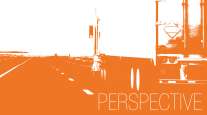Senior Reporter
Blockchain Group Formed to Advance Use of Digital Ledger
A digital ledger called Blockchain is the next big advance in the freight market, say advocates who claim it will redefine the concept of trust among business partners, expand business opportunities and provide a quantum leap in identifying every separate sequence in a freight transaction.
“In trucking, knowing whoever touched the transaction or did something is much more powerful than knowing the transaction took place,” Craig Fuller, CEO of TransRisk and co-founder of the newly formed Blockchain in Trucking Alliance, told Transport Topics.

BiTA was formed to develop common standards around blockchain applications in the trucking industry, Fuller said. Since a blockchain is an intersection of transactions, “passing off transactions between multiple sources requires common standards.”
Charter members of BiTA include: Convoy, PS Logistics, US Xpress, McLeod Software, TransRisk, Triumph Business Capital and 10-4 Systems Inc., according to BiTA. Another 70 or so companies have expressed strong interest in joining, Fuller said.
But saying blockchain is like saying internet or mobile phone, he said. “The experiences and outcomes of those experiences are different from one individual to the next. That is the important point to keep in mind.”
Simply put, according to consulting firm Deloitte, blockchain is a way for information to be recorded and shared by a community. Each member maintains its own copy of the information, and all members must validate any updates collectively.

Fuller
For Fuller, blockchain “is a way of basically looking at the world in a completely different fashion than you have in the past — which is, can we get to a place where we can do commerce or interact with one another without having to worry about who the other party is?”
For example, large 3PLs and carriers now benefit from shippers knowing who they are and having confidence that their internal processes and practices can be trusted, he said. Blockchain changes that dynamic “in the sense that now when customers are making decisions they don’t have to know a company’s history.”
“The carrier taking the load could be anonymous,” Fuller added, “and the reason is blockchain could include all of the insurance and safety, equipment and maintenance data, and the contract could self-execute a payment immediately after delivery.”
Said Lance Healy, co-founder and chief innovation officer for Banyan Technology: “I think a lot of folks will trust process and verification and validation — not right away, but we will start to see this migration of the shift of trust to the process versus the people.
“It will be less about relationships; they will always be important, but especially on an international scale it will be a lot simpler to say, ‘Well, I can trust this, this has all been verified,’ and trust in the process. Healy added he is interested in learning more BiTA.
It is good we have people not stuck in the present, but looking at what we may be able to do in the future in our industry.
Satish Jindel, SJ Consulting Group
BiTA plans an executive meeting in November to develop a framework for what “the members themselves want to accomplish,” Fuller said. A national conference is scheduled for May at Georgia Institute of Technology.
One analyst called the effort to bring blockchain to trucking futuristic.
“It is good we have people not stuck in the present, but looking at what we may be able to do in the future in our industry,” said Satish Jindel, founder of SJ Consulting Group. “Blockchain is something companies need to be aware of, but at the same time does it mean it is going to be executing things in six months to a year? I think it is further out.”
However, Healy said the timing is right to develop a new model of trust, “especially as more and more millennials enter the workforce, that is going to be more aggressively adopted. They are just so trusting of machines, What that is going to mean in terms of speed and processing time is it’s going to take a lot of the lag out of the supply chain, which is going to be very interesting.”
Banyan has begun carving out a blockchain application, he said.
It would be used for isolated transactions, he said. “So it is kind of a shorter blockchain, a couple of links. We will probably look at developing it on a platform like Microsoft’s Coco Framework. It wouldn’t be completely from scratch, so we can leverage some of the tools that are out there.”
At the same time, IBM announced a globally focused blockchain in August and will collaborate to enhance food safety with Dole, Driscoll’s, Golden State Foods, Kroger, McCormick and Co., McLane Co., Nestlé, Tyson Foods, Unilever and Wal-Mart.



